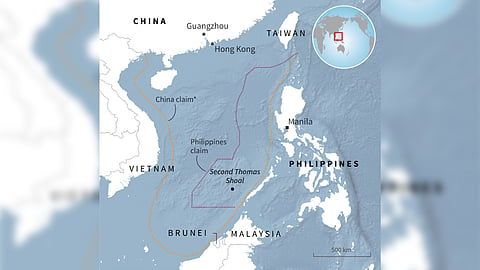
- NEWS
- the EDIT
- COMMENTARY
- BUSINESS
- LIFE
- SHOW
- ACTION
- GLOBAL GOALS
- SNAPS
- DYARYO TIRADA
- MORE

China and the country’s new strategic partner, Japan, clashed head-on over the marking of the 8th year of the Permanent Court of Arbitration award that favored the Philippines in the maritime dispute.
Japanese Foreign Minister Yoko Kamikawa said the tribunal’s award was final and legally binding on the parties to the dispute, “the Philippines and China, under the provisions of the United Nations Convention on the Law of the Sea (UNCLOS).”
Kamikawa added that the upholding and reinforcing of the free and open international order based on the rule of law “will be to the benefit of all countries, large and small.”
Her statement contrasted with Beijing’s to whom the “South China Sea arbitration is essentially [a] political circus dressed up as legal action.”
This was the response of China Foreign Ministry spokesperson Lin Jian, who said that the Philippines “fell into the trap” set by the United States and other Western countries as they gang up on China, thus affecting the relationship between the two countries.
“Japan highly appreciates the position of the government of the Philippines, which has consistently complied with the award and has shown its commitment to the peaceful settlement of disputes in the South China Sea,” Kamikawa said.
Last 8 July, the Philippines and Japan signed a Reciprocal Access Agreement (RAA) that set into motion mutual visits between Filipino and Japanese armed forces for training and joint exercises.
The Japanese official said China’s claim that it will not accept the award went against the principle of the peaceful settlement of disputes in accordance with international law.
Japan said it will continue to coordinate with the international community, such as the Association of Southeast Asian nation (ASEAN) members and the United States, to maintain and strengthen the free and open international order based on the rule of law.
False claim
China’s Foreign Ministry spokesperson claimed the arbitration case breached the Philippines’ commitment to China as the issues surrounding the disputed waters were “beyond the scope of jurisdiction of the arbitral tribunal.”
Referring to the Declaration on the Conduct of Parties in the South China Sea (DOC), Lin said the Philippines violated this declaration as Manila directly cited UNCLOS instead of resolving issues through consultations and negotiations with China.
“The Philippines abused the UNCLOS dispute settlement mechanism, ignored China’s declaration which, according to UNCLOS, excludes maritime delimitation from compulsory dispute settlement procedures, and insisted on initiating the arbitration,” the ministry spokesperson said.
Lin also slammed the arbitral tribunal for allegedly violating the principle of state consent and acted against UNCLOS and general international law.
“The award it rendered is illegal, null and void, and non-binding. China does not accept or recognize it, and will never accept any claim or action based on the award. China’s sovereignty and rights and interests in the South China Sea are under no circumstances affected by the award,” Lin said.
Meanwhile, the Department of Foreign Affairs saw the award as a testament to the Philippines’ unwavering commitment to the rule of law and peaceful settlement of disputes amid the numerous incidents in the West Philippine Sea, particularly Ayungin Shoal.
The DFA also thanked the United States and the G7 for their support of the ruling, noting that the consistent reaffirmation is a “significant milestone and a useful basis for the peaceful management and resolution of differences at sea.”
China, on the other hand, said it is committed to resolving disputes with the Philippines through direct negotiation and friendly consultation based on respecting historical facts and international law.
In June, Manila expressed its commitment to work with China to resolve their disputes and manage the tensions in the disputed waters.
More joint engagements
Global think tank Stratbase ADR Institute has called for more joint patrols in the disputed West Philippine Sea, Stratbase president Professor Dindo Manhit said during the biggest West Philippine Sea forum in celebration of the eighth anniversary of the arbitral award which rejected China’s expansive nine-dash line claim and upheld the Philippine position that China has no lawful claims to areas covered by the Philippines’ exclusive economic zone and continental shelf.
Manhit urged like-minded countries to “reinforce cooperation and elevate partnerships by conducting joint patrols and military exercises.”
“Let us likewise support the modernization of the Armed Forces of the Philippines to protect our territory and maritime resources in the West Philippine Sea,” he said.
“These measures, the institute believes, send a strong message that the Philippines is not alone. Those who attempt to circumvent their obligations and behave aggressively will not be tolerated by the international community. We will not waver in our determination and commitment,” Manhit said.
During the conference, at least 26 countries, through their ambassadors and representatives, gathered together and reaffirmed their support for the 2016 Arbitral Award.
“This year, we witnessed actions — the most aggressive by far — performed against our fellow Filipinos at sea. Our troops, fisherfolk, and vessels encountered several attempts to block rotation and reprovision missions, numerous occasions of firing of water cannons, and an alarming number of collisions and near-collisions. Our boats may be damaged and our lives may continuously be at risk, but our will to defend the West Philippine Sea has never been stronger,” Manhit said.
